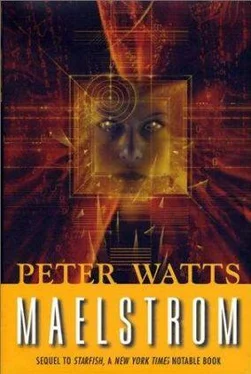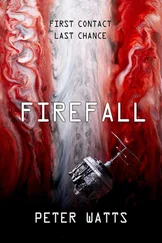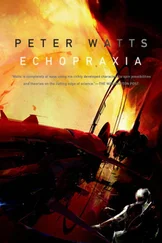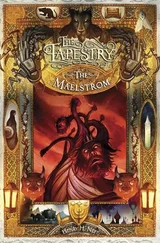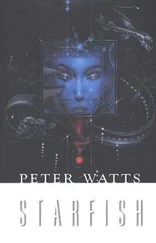A low-flying helicopter flitted past, spraying the water: the waves in its wake swelled and congealed into a swath of gelatinous foam. Lubin had ordered the shoreline gelled from Lakeshore down to Meigs; the storm would probably smash the tanglefoam to lint after a while, but if Clarke hurled herself off a bridge before that point, she'd be stuck like an ant in honey. A floating pen bobbed at the offshore edge of the gelled zone, rimmed by an inflatable boom riding the waves like a boneless serpent. Lubin tapped a control on the side of his visor; the enclosure sprang into near focus.
There .
Just for a moment, a sleek gray back, metallic inlays glinting darkly along the leading edge of the dorsal fin. Another. Half a dozen there all told, although you'd never see more than one on the surface at any given time.
The wind died.
Lubin slipped off his headset and looked around with naked eyes. It was close to noon, as dark as a solar eclipse. Overhead the sky boiled in silent, ominous slow motion.
A distant clattering roar began cascading through the city at his back: storm shutters, slamming shut along a thousand Euclidean canyons. It sounded as though the buildings themselves were applauding the rise of some long-awaited curtain. A single perfect raindrop, the size of his thumbnail, splatted on the asphalt at Lubin's feet.
He turned and entered the command hut.
* * *
Another hallucinogenic tabletop dominated the single-room enclosure. Lubin studied the chessboard: two arms of security extended out from the waterfront, diverging northwest from Grand and southwest from Eisenhower. A funnel, to guide Lenie Clarke to a place of another's choosing. Two-point-five klicks west of the seawall, a band of botflies and exoskels formed a north-south line and began sealing off skyways and tunnels.
Seven and a half square kilometers found itself excised from the world along these boundaries. Surface traffic moved within and without, but not across ; the rapitrans grid went utterly dark across its breadth. The flow of information took a little longer to cut off—
— wouldn't you know it another goddamned quarantine looks like I won't be able to make our eight-thirty after all, hello? Hello? Jesus fucking Christ…
— but eventually even electrons respected the new borders. The target, after all, was well-known to receive assistance from such quarters.
But it was not enough to simply cut this parallelogram out of the world. Lenie Clarke still moved there, among several hundred thousand sheep. Lubin let Burton off the leash for a while.
A blond Peruvian was putting a telemetry panel through its paces in one corner of the hut. Lubin joined her while Burton feasted on the application of naked force. "Kinsman. How are they doing?"
"Complaining about the noise. And they always hate freshwater ops. Makes them feel heavy."
Her panel was a matrix of views from cams embedded in the leading edge of each dolphin's dorsal fin. A gray crescent marred the lower edge of each window, where the animals' melons intruded on the view. Ghostly shapes slipped past each other in the green darkness beyond.
Endless motion. Those monsters never even slept; one cerebral hemisphere might, or the other, but they were never both unconscious at the same time. Tweaked from raw Tursiops stock only four generations old, fins and flippers inlaid with reinforcements that gave new meaning to the term cutting edge , echolocation skills honed so fine over sixty million years that hard tech could still barely match it. Humanity had tried all sorts of liaisons with the Cetacea over the years. Big dumb pilot whales, eager to please. Orcas, too large for clandestine ops and a little too prone to psychosis in confined spaces. Lags and Spots and all those stiff-necked open-water pansies from the tropics. But Tursiops was the one, had always been the one. Not just smart; mean .
If Clarke got that far, she'd never see them coming.
"What about the noise?" Lubin asked.
"Industrial waterfronts are loud at the best of times," Kinsman told him. "Like an echo chamber, all those flat reflective surfaces. You know how you feel when someone shines bright lights in your eyes? Same thing."
"Are they just complaining, or will it interfere with the op?"
"Both. It's not too bad now, but when the storm sewers start draining you're gonna have a dozen whitewater sources pounding into the lake all along this part of the seawall. Lots of noise, bubbles, stuff kicked off the bottom. Under ideal conditions my guys can track a ping-pong ball at a hundred meters, but the way it's going outside—I'd say ten, maybe twenty."
"Still better than anything else we could deploy under the same conditions," Lubin said.
"Oh, easily."
Lubin left Kinsman to her charges and grabbed his pack off the floor. The storm assaulted him the moment he left the hut's soundproof interior. The downpour drenched on contact. The sky above was as black as the asphalt below; both flashed white whenever lightning ripped the space between. Lubin's people stood on conspicuous duty along the seawall, punctuating every vantage point. The rain turned them slick and black as rifters after a dive.
Shoot to kill was a given. It might not be enough, though. If Clarke made it this far, there were too many places she could simply dive off an embankment. That was okay: in fact, Lubin rather expected it. That was what the subs and the snoops and the dolphins were for.
Only the subs were useless close to shore, and now Kinsman was saying the dolphins might not be able to acquire a target more than a few meters away …
He set his pack down and split it open.
And if the dolphins can't catch her, what makes you think you can?
The odd thing was, he actually had an answer.
* * *
Burton was waiting when Lubin got back inside. "We've rounded up a bunch of—oh, very nice. A salute to the enemy, maybe? In her final hour?"
Lubin assayed a slight smile, and hoped that someday soon Burton would pose a threat to security. His eyecaps slid disconcertingly beneath lids not quite reacclimated to their presence. "What do you have?"
"We have a bunch of people who look a lot like you do right now," Burton said. "None of them have actually seen Clarke—in fact, none of them even knew she was in town. Maybe the Anemone's losing its touch."
"The anemone?"
"Haven't you heard? That's what people are calling it now."
"Why?"
"Beats me."
Lubin stepped over to the chess board; half a dozen cylindrical blue icons shone at points where civilians were being held to assist the ongoing investigation .
"Of course, we're a long way from sampling the whole population yet," Burton continued. "And we're concentrating on the obvious groupies, the costumes. There'll be a lot more in civvies. Still, none of the people we've interrogated so far knows anything. Clarke could have an army if she wanted, but as far as we can tell she hasn't even begged a sandwich. It's completely off-the-wall."
Lubin slipped his headset back on. "I'd say it's standing her in good stead now," he remarked mildly. "She seems to have you dead-ended, anyway."
"There are other suspects," Burton said. "Lots of them. We'll turn her up."
"Good luck." The tacticals in Lubin's visor were oddly drained of color— oh, right. The eyecaps . He eyed the blue cylinders glowing in the zone, tweaked his headset controls until they resaturated. Such clean, perfect shapes, each representing a grand violation of civil rights. He was often surprised at how little resistance civilians offered in the face of such measures. Innocent people, detained by the hundreds without charge. Cut off from friends and family and—at least for those who'd have been able to afford it—counsel. All in a good cause, of course. Civil rights should run a distant second to global survival in anyone 's book. The usual suspects didn't know what was at stake, though. As far as they knew, this was just another case of officially-sanctioned thugs like Burton, throwing their weight around.
Читать дальше
